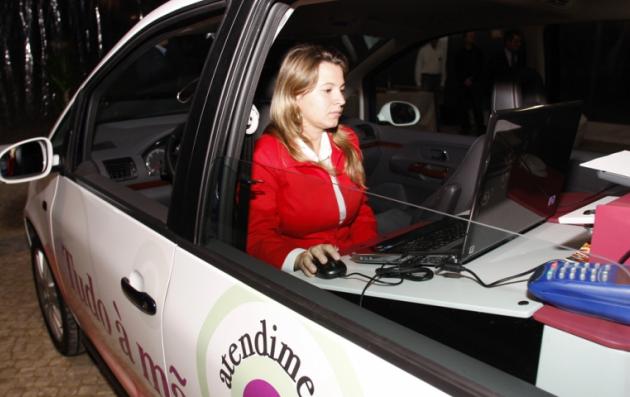Summary
The Municipality Attendance Vehicle of Palmela (PT) is designed for citizens who live far from the central public services of the city, or for inhabitants who are socially and economically isolated. The vehicle is a living lab which provides all local public services, and several national ones in a technological way. Its schedule allows citizens from the most rural areas to easily access all the services provided by the municipality. With 32 bus stops, it is the first travelling citizen store in Portugal. This initiative shows how a city can combine an approach both human and connected.
The solutions offered by the good practice
At first, the services provided by VAM were those treated at a municipal service desk and related to urbanism, water and sewage, advertising and occupation of public space, licenses for business activities (schedules and endorsement of licenses), acquisition of lunch passwords in schools, requisition of school transports, information and consumer support, miscellaneous licensing, presentation of opinions, suggestions or complaints, and information on cultural, sporting, touristic and leisure offers. Through an agreement with the Central Administration Agency (Agency for the Modernization of PublicServices in Portugal), VAM then became the first mobile one-stop-gov, providing services on social security, pensions, justice, registry and notary services, health, and much more. In addition, it’s also possible to pick up and return books requested via the internet from the municipal libraries of Palmela. In this way, VAM contributes to the reduction of bureaucracy and the reorganization of public services, thus increasing the quality of citizens’ life, good governance and simplification of public service processes, ensuring equal access to public services for rural citizens and citizens socially and geographically isolated, and a greater involvement of citizens in setting priorities in governance.
Building on the sustainable and integrated approach
VAM is part of the municipality of Palmela's integrated policy for urban development. It reflects the growing concern about the integration of urban and rural areas, viewed as complementary in a society with different lifestyles, thus requiring various modes of service supply. Considering the peri-urban territory and the citizens' needs, VAM is the best solution to satisfy these needs, engaging all stakeholders through an agreement between the local and central administration. This process contributes to local synergies, and promotes territorial sustainability and cohesion by taking into account the principals of subsidiarity and solidarity. To this end, VAM interconnects with the functional areas of municipal services, such as urban planning and strategic planning, that acts as the brain of the strategy. The opinion of citizens, companies and other stakeholders, as well as the holistic vision and the integrated work between several municipal services, are one of the crucial aspects to ensure the sustainable and integrated approach to tackle urban challenges and needs. It's a "less money, more innovation" policy that ultimately aims to increase resilience, the cohesion of territories, social inclusion and public shareholding without forgetting the compromise between the organisation, citizens and businesses (namely, maintain the quality of public services provided in different shapes).
Based on a participatory approach
Palmela started the co-design by organising some executive meetings including the population. This way, people could see who was ruling the place where they lived, they could talk about their needs and suggest solutions. Again, the beginning of VAM’s work was a way of squeezing the distance between citizens and executives. Citizens can solve their problems near the place they live and pass their concerns on to the person they talk to. On the other hand, municipality employees are much more motivated to listen and to try and help the population with issues. Inhabitants took part in the conception of VAM project through meetings with neighbourhood associations, “Parish Weeks” (decentralisation of the local government to the five parishes for a week) and public debates, as also thought communication with the different city hall employers. At the same time, a co-working process as an extern stakeholders work occurs inside the City Hall, that leads not only to a co-design process but also a co-production one. The implementation of the project includes various partners such as AutoEuropa (vehicle production), AutoVision and CEIIA (R&D Centers), in order to satisfy the citizens' needs, and provides the city hall with solutions in smart symbioses and synergies.
What difference has it made?
VAM is part of the Integrated Urban Development, Governance and Social Inclusion Strategies of Palmela municipality. The VAM project contributes to the improvement of quality services available to citizens, tailoring the services to their needs and thus avoiding long travels through the country, to reducing bureaucracy and streamlining processes, to increasing the efficiency and effectiveness of services in a global quality perspective in accordance with the new model of decentralised attendance of public services (integrated and multichannel), to the organisational development and economic and financial sustainability of the municipality; to the promotion of innovation for the benefit of local communities, and to the increasing qualification of human resources. Therefore, VAM is an important project for territory development, increasing the ability to attract and support inhabitants and economic activities as well as promoting social and economic cohesion and governance-by-partnership processes. By using the Internet in order to find the best solution for citizens' needs, the VAM project is a crucial stage in the implementation of the Palmela Human Smart City Hall strategy.
Why should other European cities use it?
The VAM could be replicated in the whole country, or in other European countries, because a territorial presence of public services in rural or isolated areas has been rethought in most countries in the European Union. Considering the need to provide public services to these populations, usually with specific needs, and the economic and financial unfeasibility to maintain the traditional fixed front desk administration, the bet on a format using a mobile unit promotes greater efficiency and effectiveness, allowing even greater personalisation of the service provided. The possibility of using vehicles with different functions of public services (i.e. health and education) could be considered.
-
449_Palmela_Gpsummary.pdf(PDF, 667Ko)

